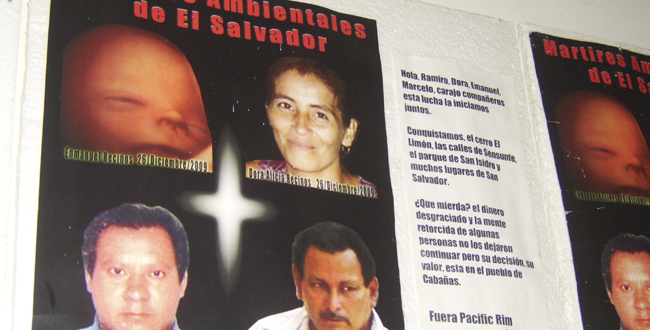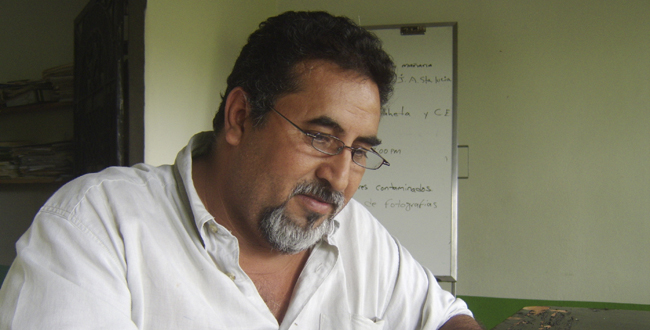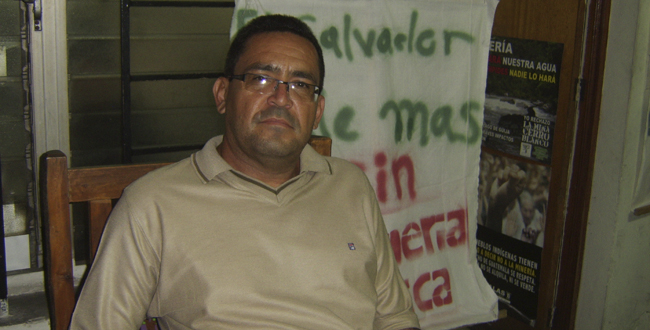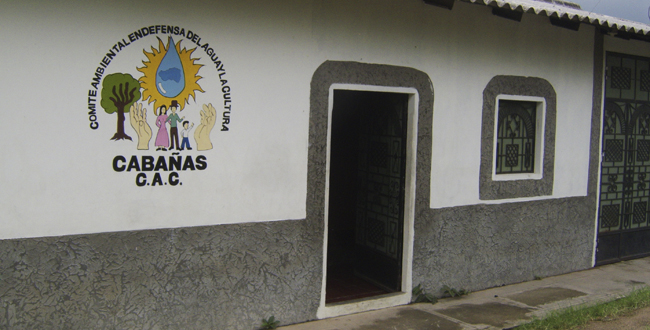Mining Ambition Impedes Environmental Justice
The National Roundtable against Metallic Mining and environmental organizations consider that by allowing mining in El Salvador, the repercussions for the environment would exceed the multi-million debt that the country currently faces in the lawsuit filed by Pacific Rim.
By Ivannia Serrano
Translated by Jan Morrill

The last UN UNDAC (United Nations Disaster Assessment and Coordination Office) report in 2011 revealed that El Salvador is among the top ten most vulnerable countries in the world. There has been a 30% loss of bio-diversity; it’s the most deforested country in American Continent after Haiti. It also has the least access to water in the Central American Region.
Luis Gonzalez, from the Climate and Energy Division of the UNES, says “we have water access of between 1700 and 1800 m³, when the Central American average is 10,000 m³. That means that we are below average.”
He adds that El Salvador has had a drop in water levels in its rivers over the last fifty years, except for the Acelhuate River, which has had an increased flow because it transports 600 tons of feces daily. Along these lines, there are water level studies that indicate that the majority of rivers will disappear been 1,600 and 1,200 years from now, and in the case of the Lempa River, the most strategic water resource in the country, between100 and 160 years.
Studies by the Ministry of the Environment and Natural Resources (MARN) show that only 2% of the water in the country is in “good” quality category.
With respect to this situation, Gonzalez claims that mining is not feasible in El Salvador, because one of the main impacts on a national level that could be created by mining would be on the water.
According to technical and scientific studies the gold particles found in El Salvador are scattered in the soil, and in many cases are microscopic. For this reason, the only economically feasible method for extracting this gold from the rock is through leaching, a physiochemical process in which gold is separated from rock by adding cyanide.
A specialist in climate and energy, Luis Gonzalez, explained that the use of cyanide is very harmful. “Cyanide is a very toxic chemical, to the point where the amount of cyanide equivalent to a grain of rice can kill an adult human being. Also, the heavy metals released could be arsenic, selenium, and lead which are also pollutants and can be toxic.”
 According to research done by the UNES, each mining project would use 40 tons of cyanide a day. This, like many heavy metals, is a bioaccumulator, which means that if it is not absorbed by the environment little by little it can accumulate in the soft tissues of human beings. Consequentially, it causes degeneration at the cellular level and is the root of a number of illnesses like kidney disease, migraines, impotency, infertility, fetal damage, etc.
According to research done by the UNES, each mining project would use 40 tons of cyanide a day. This, like many heavy metals, is a bioaccumulator, which means that if it is not absorbed by the environment little by little it can accumulate in the soft tissues of human beings. Consequentially, it causes degeneration at the cellular level and is the root of a number of illnesses like kidney disease, migraines, impotency, infertility, fetal damage, etc.
Most of the gold mining companies in the world are Canadian. In El Salvador, Pacific Rim has been at the forefront. Many other companies, like Minerales Morazan, are also subsidiaries of Pacific Rim. However, Gonzalez said “it’s a junior firm, which specializes, more than anything, in exploration and when the exploration is finished they sell the project to a larger company.”
Currently, Pacific Rim has an exploration permit. However, in response to government opposition, which has not given a the company mining exploitation permit, the company has filed a $120 million lawsuit against the country in the International Center for the Settlement of Investment Disputes ICSID, arguing profit expropriation.
To date, the process remains open, and a law that bans mining is the only way to avoid the actions taken by mining companies and possible suits against the government. According to Gonzalez, as long as the process continues, Pacific Rim can increase the amount of the suit by arguing they are incurring procedural costs. Also, this forces the Salvadoran Government to pay huge amounts of money to the international lawyers that are defending their case. According to studies done by FESPAD there have been more than $5 million spent already.
However, for the UNES representative, Pacific Rim has acted in the same way as mining companies throughout the world. “They arrive in a community and begin to buy people off, to sponsor the patron saint festivals for the mayor’s office, school uniforms for the children, the give out some bags, medical or eye campaigns, and obviously they create the false promise of some type of employment, and what all this has caused in the department of Cabañas, one of the areas most affected by metallic mining, is that there are divisions in way people think.”
 This idea is shared by Francisco Pineda, founder and president of the Environmental Committee of Llano de la Hacienda en Cabañas, who testifies that the deaths of five environmentalists in the area are the result of opposition by the population to mining at the “El Dorado” mine.
This idea is shared by Francisco Pineda, founder and president of the Environmental Committee of Llano de la Hacienda en Cabañas, who testifies that the deaths of five environmentalists in the area are the result of opposition by the population to mining at the “El Dorado” mine.
“The threats began when the communities became organized and to carry out direct action. Because of this, the company feels its investments are being threatened and it sued the government at the ICSID and that is when we began to receive more threats,” said Francisco.
Among the environmental leaders who were murdered, Dora Alicia Recinos stands out. She was 32 years old, a member of the Environmental Committee of Cabañas, and was 8 months pregnant when she died.
Juan Francisco Duran Ayala was most recent murder on June 24, 2011. Pineda describes him as a young man who studied foreign languages, and who could have helped with translating documents, because he was skilled. After his disappearance, he was found dead in Lamatepec with a gunshot wound to his head.
“To date we have not seen any investigations that clarify the facts in this case, and in the other cases, they say it was because of personal feuds,” says Pineda, who in 2011 received the Goldman Prize, one of the most recognized prizes on an international level, for his struggle against mining company Pacific Rim.
 From his point of view, Pineda considers that a year after Juan Francisco´s the death, the Attorney General’s office has not been effective and its investigations it clings to its hypothesis and ignore the hypothesis that the population has proposed.
From his point of view, Pineda considers that a year after Juan Francisco´s the death, the Attorney General’s office has not been effective and its investigations it clings to its hypothesis and ignore the hypothesis that the population has proposed.
In this sense, he considers that his hypothesis should be taken into account and that not only should mining company representatives be investigated, but also legislative representatives, “there were close ties with mining companies during the elections. We believe that Pacific Rim has helped finance part of the political campaigns and that is why there is an agreement between them.”
In response to the issue, the mayor of San Isidro, José Bautista warns that the Legislative Assembly or the President of the Republic have the last word on whether mining will be approved or not. Also, he is close-lipped about the murders in his department.
Francisco Pineda, who has lost count of how many threats he has received in spite of protection given to him by the government, will not stop in the struggle to defend his land, the community and the country.
As part of the actions taken to defend natural resources in the country, the National Roundtable against Metallic Mining, presented an alternate document to the ICSID called an “Amicus Curiae” or Friend of the Tribunal. The idea in this process, according to Rodolfo Calles, the Roundtable facilitator, is “to present a number of arguments of why mining isn’t feasible in El Salvador to better illustrate our position against mining for the judges.”
 To date, there has not been a response from the ICSID. For Rodolfo, this is because the majority of the arguments they presented are about human rights and the environment, which don’t represent weighty argument for this regulatory institution, because it is a predominantly trade-focused organization.
To date, there has not been a response from the ICSID. For Rodolfo, this is because the majority of the arguments they presented are about human rights and the environment, which don’t represent weighty argument for this regulatory institution, because it is a predominantly trade-focused organization.
Even so, the Roundtable is committed to continuing to provide support for the legal issues, and to continuing to provide proof and testimony of how mining affects the country. These efforts have been supported by international allies from the U.S. and Canada, including information campaigns to raise awareness in the public and to pressure Pacific Rim to drop their suit against the government.
Currently there are 25 exploration permit applications and 29 mining exploration concessions for gold and silver, which could in turn become 25 new law suits for the country, because there is still a national legal framework that does not ban mining as such.
For this reason, the National Roundtable proposes a law that would ban metallic mining. In the first place, to avoid more deaths in Cabañas because as long as there is a possibility for mining there will be opposition and violence. Secondly, to eliminate the threat of environmental degradation.
“Even if we loose the suit, it’s preferable to pay the 100 or 200 million, instead of allowing mining in El Salvador, because the environmental costs are much more than the amount of the suit” he claimed.
